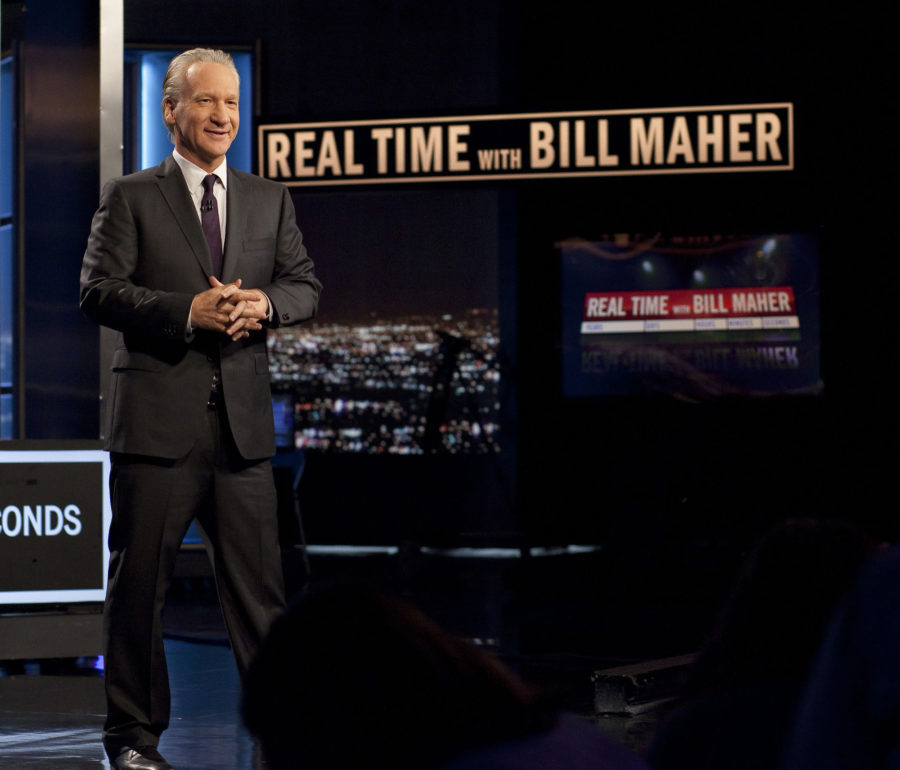Bill Maher to perform at Virginia Theatre on Sunday
Real Time With Bill Maher Season 10
November 4, 2015
Daily Illini: You had a stand-up special (Live from D.C.) come out just last year. Is the new performance mostly new material, or do you recycle old jokes as well?
Bill Maher: Oh no. Recycling old stuff is not in my vocabulary. That’s the biggest no-no. I would never do that. If I paid to see a comedian and he did a show I just saw last year on HBO, I’d be furious. One of the great advantages of doing topical material is that it changes all the time. I’m not the comedian who needs to stare at a lamp to figure out what’s funny about it.
DI: So what should people expect? Your normal political commentary, or is there some other theme for this tour?
Maher: It’s certainly political commentary. The difference with stand-up as opposed to Real Time is that it’s all laugh-out-loud funny. That’s what stand-up is. I take it seriously. I don’t think a stand-up comedian should be a humorist. It’s not a lecture, it’s not a TED talk. It’s to make you laugh. But I think I cover the same kind of subjects I’ve always been into: politics, what’s going on in the world, religion. You know, the kinds of things you’re not supposed to bring up at a polite party.
Get The Daily Illini in your inbox!
DI: You started as a stand-up, but now you’re busy with a lot of different projects. Why do you still make stand-up a priority?
Maher: The main reason is I love it. It’s really fun. It hasn’t always been fun. When you start out, comedy is very painful those first few years, and then it’s sort of drudgery the next few years after that when you’re playing small clubs. If you’re lucky enough to start playing nice theaters, where people are coming out to see you instead of just some local comic at a comedy club, you might as well take advantage of that because that’s when it’s really fun. I just enjoy the hell out of it. The other reason I think it’s important is, as someone who does a show every Friday night commenting on the country, I think I should see the country. I watch a lot of these people on television — Bill O’Reilly comes to mind — I don’t think Bill O’Reilly ever sees America, I think he sees the commute from Long Island to the Fox Studio in New York. He might talk about the fly-over states … I land in them.
DI: Do you make it a priority to perform in smaller markets?
Maher: I try to go to every market. I say to my agent, give me some new territories. Present me with some places people wouldn’t expect me to go. I love being in the South. I love being in red states, because there are always a lot of blue people dying for someone who thinks like them to come to their area. I’ll go anywhere where there’s a couple of thousand people who want to see some free-thinking comedy.
DI: You’ve been doing comedy for more than 20 years. Have you noticed any changes in the audience during that time?
Maher: Well they’re certainly nicer to me. It’s one thing when you have to do out there and win them over. It’s nice when you go out there and you know the people know you, know what you do. It makes you really want to do it for them. There’s nothing I like better than looking down and seeing someone in the front row that’s just a puddle. That’s a big part of it. I don’t think the audience has changed that much in my crowd, because they know who they’re going to see. They’re obviously people who are interested in the world, or they wouldn’t be seeing me.
DI: You’re coming through two college towns this tour. Do you find that you draw the college crowd, or does your audience tend to be older?
Maher: It’s a mix. I’m always surprised when I see how many young people there are. It’s much more than it used to be. First of all, young people generally have less money, so it’s harder for them to buy a ticket to anything. I’m always grateful for a healthy percentage of young people in the audience coming to see me. I think what millennials value the most is authenticity. I think they really get that that’s my bond with the audience. I’ll tell you how I feel, even if you don’t like it. Even if it makes you boo me, it’s at least real.
DI: You’re a comedian, but you also serve a role as a social critic and an educator as well. What kind of responsibility do you think that puts on you?
Maher: I think it’s a tremendous responsibility, because I don’t think any other liberals do it. I think if you watch other liberal comedians who talk about politics, I don’t see any of them ever say anything that would challenge what liberals already believe. I’m a proud liberal, but sometimes liberals are wrong too and someone in their camp needs to try to tell them.







